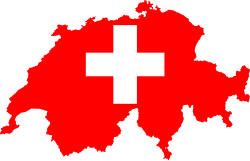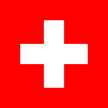| Switzerland | |
 | |
| location | |
 | |
| Flag | |
 | |
| Main information | |
| Capital city | Bern |
| Political system | federal republic |
| Currency | Swiss franc (CHF) |
| Surface | 41 290 |
| Population | 8 466 017 |
| Tongue | German, Italian, French, Romansh |
| religion | Catholicism, Calvinism |
| Code | 41 |
| Internet domain | .ch |
| Time zone | UTC 1 - winter UTC 2 - summer |
| Time zone | UTC 1 - winter UTC 2 - summer |
Switzerland - country located in Central Europe, in the Alps, in between Austria, France, Liechtenstein, Germany and Italy.
Characteristic
Switzerland, beautiful at any time of the year, is the perfect place to relax. Nowhere else can you find such unique diversity in a small area: mountains, lakes, glaciers, lively cities and unspoiled landscapes. Everywhere can be easily and conveniently reached thanks to the unique public transport network. Depending on the canton, you can feel like in France, Italy or Germany. The coexistence of different cultures has resulted in many interesting monuments of architecture and art.
Geography
In the north, there are the Jura Mountains, which reach a height of 1679 m. They are separated from the Alps, which cover 61% of the country, by the Swiss Plateau at 500 m. Switzerland's highest peak is Dufourspitze, 4634 m high, in the Pennine Alps. The Rhine and the Rhône are among the country's longest rivers.
fauna and Flora
Climate
Switzerland is located in the temperate climate zone, but the climatic conditions in this country are greatly influenced by large differences in altitude. Winters are cold, with an average temperature of 0 ° C in the highlands and valleys, while in the mountains the temperature drops to -10 ° C or lower. The temperature in summer ranges from 18 to 20 ° C and decreases with increasing altitude. In the upper parts of the mountains, snow and ice do not melt all year round.
History
Culture and art
Policy
Economy
Society
Traditions
Preparations
Travel time selection
Switzerland is attractive at any time of the year. Summer is a time of active recreation (e.g. canyoning) and hiking. Spring and fall are equally warm and pleasant, with lower prices and less crowded resorts. Winter (until the end of April) is the time of madness in alpine ski resorts.
Visas
The travel document entitling to visa-free entry and tourist stay for up to 90 days is a passport or ID card. There is no absolute obligation to present a return ticket, but Swiss border authorities may require it.
Customs regulations
There are no quota restrictions when importing and exchanging money. There are also no customs restrictions that differ from generally accepted standards. It is forbidden to bring firearms and gas weapons, sprays, stun guns, knives, especially those opened with one hand (spring, butterfly), as well as bayonets, sticks, etc. items. People breaking this ban are fined several hundred francs and may be expelled from the country.
Currency exchange
Insurance
Personal insurance is not obligatory, but due to the very high costs of treatment and hospital stay, people traveling to Switzerland should obtain a health insurance policy - preferably one that covers both the costs of possible hospital treatment and medical transport to Poland.
Phrase book
Drive
By plane
By train
By car
By bus
Cantons
Switzerland is a federal state consisting of 26 cantons, 143 districts and 2,222 municipalities, which enjoy a very wide autonomy.
.png/530px-Map_of_Switzerland,_political_and_international_(CIA).png)
- wa
- Appenzell Innerrhoden
- Aargau
- Basel-City
- Basel-county
- Bern
- Friborg (Canton)
- Geneva (Canton)
- Glarus (Canton)
- Graubunden
- Jura (Canton)
- Lucerne (Canton)
- Neuchâtel (Canton)
- Nidwalden
- Obwalden
- Sankt Gallen (Canton)
- Schwyz (Canton)
- Solothurn (Canton)
- Schaffhausen (Canton)
- Ticino
- Thurgau
- Uri (Canton)
- Valais
- Vaud
- Zug (Canton)
- Zurich (Canton)
Cities
According to official data from 2011, Switzerland had over 220 cities. The seat of parliament Bern ranks only fifth, with 5 cities with a population of 100,000 ÷ 500,000; 5 cities with a population of 50,000 ÷ 100,000, 14 cities with a population of 25,000 ÷ 50,000; 95 cities with a population of 10,000 ÷ 25,000 and the rest of the cities below 10,000 residents.
Interesting places
Objects from the UNESCO World Heritage List
- Jungfrau-Aletsch-Bietschhorn
- Benedictine monastery of St. John in Müstair
- Monte San Giorgio
- Abbey Saint Gallen
- Three castles, city walls and fortifications Bellinzon
- Vineyards of Lavaux
- Historic complex in Bernie
Transport
Trip
Tongue
Shopping
Gastronomy
Switzerland does not have great culinary traditions, but draws from German, French and Italian cuisine (in the canton of Ticino) and can be quite heavy, which is an advantage in the Alpine climate, especially in winter.
Cheese is the basis of many dishes, such as fondue if raclette (melted cheese dish usually served with potatoes and tiny onions). Rösti (crispy fried potato slices) is a traditional dish in German-speaking Switzerland. Sausages are also eagerly eaten (Wurst) and veal, which in Zurich is served thinly in a cream sauce (Geschnetzeltes Kalbfleisch). Bündnerfleisch it's smoked, thin-sliced beef. Fresh fish often appear on the Swiss menu, especially in towns located by the lakes.
Vegetarians should try it Alpermagaroninen, i.e. baked macaroni and cheese, usually served with boiled apple and onion. Soups are eagerly eaten, often served with tiny dumplings called Knöpfli.
Swiss chocolate, excellent in itself, is used in the preparation of desserts and cakes.
The healthiest dishes are served for breakfast or as a snack: Müsli is a dish invented in Switzerland at the end of the 19th century. The most popular is the variety Birchermüsli, although they are often served with cream that is not conducive to keeping the figure.
Accommodation
Science
work
Great caution should be exercised in relation to people offering work arrangements in Switzerland in Poland (without obtaining an entry visa) - most often these are fraudsters who extort money.
Security
There is no greater risk of crime, but there are more and more thefts of money and documents (especially in large cities such as Zurich or Geneva, at airports and train stations).
Health
Medical care is at a high level. The average cost of a day stay in a hospital is around CHF 700. Fees in private clinics are much higher. A medical visit costs an average of CHF 100 to several hundred. People suffering from illnesses requiring treatment with psychotropic drugs or derivatives of narcotic drugs should absolutely have an appropriate medical certificate with them. There have been cases of imposing fines for the possession of prohibited substances (not necessarily drugs), including drugs on the list of regulated measures. Switzerland does not respect the E-111 form relating to the settlement of treatment costs in EU countries.
contact
Telephone
Internet
post
Tourist information
Diplomatic representations
Diplomatic missions accredited in Switzerland
Embassy of the Republic of Poland in Bern
Elfenstrasse 20a, Postfach 151, 3000 Bern 15, Switzerland
Phone: 41 31 358 02 02
Fax: 41 31 358 02 16
Web page: https://berno.msz.gov.pl/pl/
E-mail: [email protected]
Diplomatic representations accredited in Poland
Swiss Embassy in Warsaw
Aleje Ujazdowskie 27
00-540 Warsaw
Phone: 48 22 628 04 81
Fax: 48 22 621 05 48
Web page: https://www.eda.admin.ch/eda/pl/home/reps/eur/vpol/embwar.html
E-mail: [email protected]

